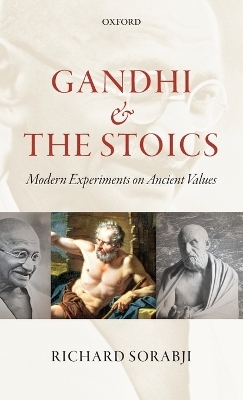
Gandhi and the Stoics
Oxford University Press (Verlag)
978-0-19-964433-9 (ISBN)
Richard Sorabji presents a fascinating study of Gandhi's philosophy in comparison with Christian and Stoic thought. Sorabji shows that Gandhi was a true philosopher. He not only aimed to give a consistent self-critical rationale for his views, but also thought himself obliged to live by what he taught--something that he had in common with the ancient Greek and Christian ethical traditions. Understanding his philosophy helps with re-assessing the consistency of his positions and life.
Gandhi was less influenced by the Stoics than by Socrates, Christ, Christian writers, and Indian thought. But whereas he re-interpreted those, he discovered the congeniality of the Stoics too late to re-process them. They could supply even more of the consistency he sought. He could show them the effect of putting their unrealised ideals into actual practice. They from the Cynics, he from the Bhagavadgita, learnt the indifference of most objectives. But both had to square that with their love for all humans and their political engagement. Indifference was to both a source of freedom.
Gandhi was converted to non-violence by Tolstoy's picture of Christ. But he addressed the sacrifice it called for, and called even protective killing violent. He was nonetheless not a pacifist, because he recognized the double-bind of rival duties, and the different duties of different individuals, which was a Stoic theme. For both Gandhi and the Stoics it accompanied doubts about universal rules. Sorabji's expert understanding of these ethical traditions allows him to offer illuminating new perspectives on a key intellectual figure of the modern world, and to show the continuing resonance of ancient philosophical ideas.
Richard Sorabji is author or editor of over 100 books in the History of Philosophy. Three authored books deal with the nature of the physical universe (Necessity, Cause and Blame; Time, Creation and the Continuum; Matter, Space and Motion). Four deal with Mind and Morals (Animal Minds and Human Morals; Emotion and Peace of Mind; Aristotle on Memory; Self: Individuality, Life and Death). He has written a biography, Opening Doors, of the pioneer lawyer, Cornelia Sorabji. His next book will be Moral Conscience through the Ages. He is Honorary Fellow of Wolfson College, Oxford; Fellow and Emeritus Professor of King's College, London; former Director of the Institute of Classical Studies, London, 1991-6; former President of the Aristotelian Society, 1985-6; and former Gresham Professor of Rhetoric 2000-2003.
Introduction: Gandhi's use of Platonic, Christian, and Stoic values: reinterpretation, experimentation, and mere convergence ; 1. Emotional detachment: how to square it with love of family and all humans in the Stoics and Gandhi ; 2. Emotional detachment: how to square with politics in the Stoics and Gandhi ; 3. Individual freedom: Gandhi's and Isaiah Berlin on Zeno's-sour grapes? ; 4. Non-violence as universal love: origins and Gandhi's supplements to Tolstoy-dilemmas, successes, and failures ; 5. From universal love to human rights? ; 6. Individual duty: persona, svadharma ; 7. General rules in morality ; 8. Moral conscience ; 9. Restrictions on private property in Gandhi, Christianity, Plato, and the Stoics ; 10. Isaiah Berlin's Stoic revolution: depoliticisation ; Select Bibliography ; Index
| Zusatzinfo | 3 illustrations |
|---|---|
| Verlagsort | Oxford |
| Sprache | englisch |
| Maße | 148 x 219 mm |
| Gewicht | 416 g |
| Themenwelt | Geisteswissenschaften ► Philosophie ► Ethik |
| Geisteswissenschaften ► Philosophie ► Östliche Philosophie | |
| Geisteswissenschaften ► Philosophie ► Philosophie Altertum / Antike | |
| Geisteswissenschaften ► Religion / Theologie | |
| Sozialwissenschaften | |
| ISBN-10 | 0-19-964433-0 / 0199644330 |
| ISBN-13 | 978-0-19-964433-9 / 9780199644339 |
| Zustand | Neuware |
| Haben Sie eine Frage zum Produkt? |
aus dem Bereich


